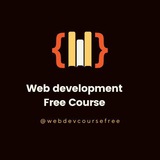tg-me.com/webdevcoursefree/2110
Last Update:
Want To become a Backend Developer?
Here’s a roadmap with essential concepts:
1. Programming Languages
JavaScript (Node.js), Python, Java, Ruby, Go, or PHP: Pick one language and get comfortable with syntax & basics.
2. Version Control
Git: Learn version control basics, commit changes, branching, and collaboration on GitHub/GitLab.
3. Databases
Relational Databases: Master SQL basics with databases like MySQL or PostgreSQL. Learn how to design schemas, write efficient queries, and perform joins.
NoSQL Databases: Understand when to use NoSQL (MongoDB, Cassandra) vs. SQL. Learn data modeling for NoSQL.
4. APIs & Web Services
REST APIs: Learn how to create, test, and document RESTful services using tools like Postman.
GraphQL: Gain an understanding of querying and mutation, and when GraphQL may be preferred over REST.
gRPC: Explore gRPC for high-performance communication between services if your stack supports it.
5. Server & Application Frameworks
Frameworks: Master backend frameworks in your chosen language (e.g., Express for Node.js, Django for Python, Spring Boot for Java).
Routing & Middleware: Learn how to structure routes, manage requests, and use middleware.
6. Authentication & Authorization
JWT: Learn how to manage user sessions and secure APIs using JSON Web Tokens.
OAuth2: Understand OAuth2 for third-party authentication (e.g., Google, Facebook).
Session Management: Learn to implement secure session handling and token expiration.
7. Caching
Redis or Memcached: Learn caching to optimize performance, improve response times, and reduce load on databases.
Browser Caching: Set up HTTP caching headers for browser caching of static resources.
8. Message Queues & Event-Driven Architecture
Message Brokers: Learn message queues like RabbitMQ, Kafka, or AWS SQS for handling asynchronous processes.
Pub/Sub Pattern: Understand publish/subscribe patterns for decoupling services.
9. Microservices & Distributed Systems
Microservices Design: Understand service decomposition, inter-service communication, and Bounded Contexts.
Distributed Systems: Learn fundamentals like the CAP Theorem, data consistency models, and resiliency patterns (Circuit Breaker, Bulkheads).
10. Testing & Debugging
Unit Testing: Master unit testing for individual functions.
Integration Testing: Test interactions between different parts of the system.
End-to-End (E2E) Testing: Simulate real user scenarios to verify application behavior.
Debugging: Use logs, debuggers, and tracing to locate and fix issues.
11. Containerization & Orchestration
Docker: Learn how to containerize applications for easy deployment and scaling.
Kubernetes: Understand basics of container orchestration, scaling, and management.
12. CI/CD (Continuous Integration & Continuous Deployment)
CI/CD Tools: Familiarize yourself with tools like Jenkins, GitHub Actions, or GitLab CI/CD.
Automated Testing & Deployment: Automate tests, builds, and deployments for rapid development cycles.
13. Cloud Platforms
AWS, Azure, or Google Cloud: Learn basic cloud services such as EC2 (compute), S3 (storage), and RDS (databases).
Serverless Functions: Explore serverless options like AWS Lambda for on-demand compute resources.
14. Logging & Monitoring
Centralized Logging: Use tools like ELK Stack (Elasticsearch, Logstash, Kibana) for aggregating and analyzing logs.
Monitoring & Alerting: Implement real-time monitoring with Prometheus, Grafana, or CloudWatch.
15. Security
Data Encryption: Encrypt data at rest and in transit using SSL/TLS and other encryption standards.
Secure Coding: Protect against common vulnerabilities (SQL injection, XSS, CSRF).
Zero Trust Architecture: Learn to design systems with the principle of least privilege and regular authentication.
16. Scalability & Optimization
Load Balancing: Distribute traffic evenly across servers.
Database Optimization: Learn indexing, sharding, and partitioning.
Horizontal vs. Vertical Scaling: Know when to scale by adding resources to existing servers or by adding more servers.
ENJOY LEARNING 👍👍
#backend
BY Web Development
Warning: Undefined variable $i in /var/www/tg-me/post.php on line 283
Share with your friend now:
tg-me.com/webdevcoursefree/2110
